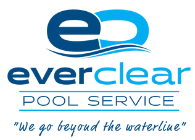In the world of in-ground pools there are three basic types: fiberglass, vinyl liner, and concrete. Here we will take a look at each type of pool material and mention the pros and cons of each.
Fiberglass
Advantages
- Low Maintenance: Fiberglass pools are easy to maintain because the gel coat on the surface is almost non-porous unlike concrete pools. Large cavities and pores provide homes for algae and other things to grow. Fiberglass pool owners spend about 75% less time cleaning and maintaining.
- Faster Installation: Fiberglass pool shells are constructed in a factory not at the site of the installation allowing for installation of the pool to take as little as two days and you to get in and enjoy the pool right away.
- Durability: there is no worry of puncturing this pool because there is no liner involved. There are many different things that can puncture a pool liner such as: dog nails, branches, patio furniture blown in the pool during a storm, and more. Fiberglass pools are very strong and durable, eliminating the need to be careful with daily use.
- Style: There are many more style options available for fiberglass pools today some include: colored finishes, ceramic tile look, tanning ledges, water features, lights, elevated hot tub/spa, and poolside walls. With the new style choices fiberglass has grown in popularity.
- Compatibility with Salt: Salt chlorinators are a low maintenance and high water quality option for pools. Salt can be harsh on other pool types. Salt is not harsh on a fiberglass shell.
- Cost Over Lifetime of Pool: the costs of maintaining a fiberglass pool are relatively low over the entire life of the pool because the maintenance needs of fiberglass are much less than other pool materials.
Disadvantages
- Initial Cost: The cost of buying the fiberglass pool is actually much higher than other materials.
- Shapes and Sizes: Since fiberglass pools are pre-made before arriving at your home, you will not be able to customize the size, shape, and depth of the pool you purchase.
Concrete
Advantages
- Design the Pool: Concrete pools are poured and constructed from start to finish on site, because of this you can choose whatever size and shape you desire. As long as your budget allows of course.
- Durability: Concrete is a very durable material and there is very little worry of damage from outside objects.
Disadvantages
- High Maintenance: Concrete is a purpose material and this allows for things to grow down into the pores. When algae grows in the pores it can be a pain to remove. Pool builders recommend using a steel brush on the surface once a week to keep algae out of pores.
- High Maintenance Cost: Concrete requires more cleaning and chemicals thus making it more expensive in the long run to own a concrete pool than a fiberglass one.
- More Chemicals Required: Since algae likes to make itself comfy in the pores of the pool, water balance takes more effort. Concrete itself is alkaline based increasing pH levels of the water and requiring acid to be added.
- Not Good For Salt: Dissolved salt in the water of a concrete pool will shorten the life of the finish on the inside of a concrete pool. Salt pools made of concrete will require more frequent refinishing.
- Long Time to Install: Concrete pools take the longest to install it can take anywhere from 3 to 6 months to install a concrete pool.
Vinyl Liner
Advantages
- Low Cost to Purchase: A vinyl liner can cost up to $10,000 less than a fiberglass or concrete pool. This makes in-ground pools affordable and possible for folks with lower budgets.
- Customizable Shape: Most vinyl liner pools are rectangular, but you can also customize the shape of pool you want with a vinyl liner. Choosing your own shape costs a bit more.
Disadvantages
- Replacing: vinyl liners have a lot less life expectancy than other pool types. Vinyl liners last anywhere from five to nine years and cost around $4,000 to replace including liner, supplies, and labor to replace.
- Warranties Not Usually Simple: many of these liners will come with a twenty year warranty leading a purchaser to believe the liner is supposed to last 20 years, but when you look at the fine print the warranty only covers the seams and/ or a credit toward a new liner not a full replacement.
- Algae Growth: There are areas of the pool with uncirculated water which allows for algae growth.
So which liner should you choose when you purchase an in-ground pool? The answer depends on your particular situation. Concrete pools are excellent for people with a higher budget who need a customizable pool shape or depth and can afford regular pool maintenance. Vinyl liners are a good fit for someone with a lower budget. Fiberglass pools are a good choice for those who have a higher budget, want little maintenance, and don’t need to have a custom pool.
For more great pool care, advice, and information please feel free to browse our website or contact us anytime.
